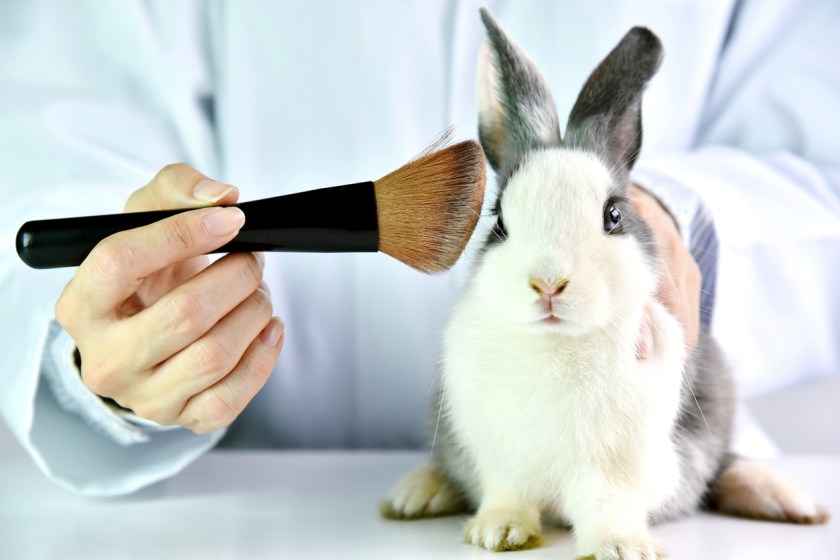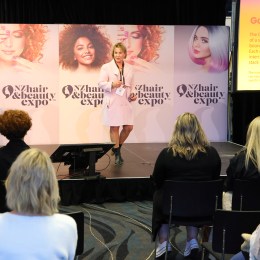A staggering 80% of countries do not have laws in place to protect against animal testing in cosmetics – and this includes Australia. Despite the industry’s shift in ethos steering towards responsibility, authenticity and overwhelmingly cruelty-free, it seems we are still fighting a losing battle against animal testing.
Animal testing for the purpose of cosmetics and ingredients trials has continued over the last 50 years, despite more efficient and ethical options being readily available for some time. Cruelty Free International estimates that globally, around 500,000 animals suffer cosmetic testing every year, amounting to 1,390 per day and 25 million over 50 years. A single ingredient being tested can kill at least 1,400 animals alone.
If anyone is leading the charge against animal testing from within the industry itself, it’s the Body Shop Australia, so we spoke to Communications Manager Jessica Styles for some industry insight.
“Traditionally, cosmetics have been tested on animals to demonstrate efficacy and safety,” says Jessica. “Across most of the world, animal tests for cosmetics products and ingredients are not specifically required by law nor are they forbidden. To market a product, a company must demonstrate its safety, but this can now be done effectively and reliably using approved non-animal tests and combinations of existing ingredients that have already been established as safe for human use. Rabbits, guinea pigs, mice, hamsters and rats continue to be injected, gassed, force-fed and killed for cosmetics testing worldwide.”
Although most of us are already acutely aware of the epidemic that is animal testing, not too many of us are familiar with the intimate details and procedures that are carried out. So what exactly does cosmetic testing involve?
“An example of a typical animal test for cosmetics includes the ‘Repeated Dose Toxicity’ test,” says Jessica. “This is a test to assess any persistent or progressive dysfunction of cells, organs or systems resulting from long-term exposure to a substance. The liver is the primary site of potential toxic injury. To assess toxicity, rabbits or rats are forced to eat or inhale a cosmetics ingredient or have it rubbed onto their shaved skin every day for 28 or 90 days and are then killed. Several reviews of the ability of animal tests to predict human toxicity have found that they are only 40-60% predictive.”
Jessica tells us that if business owners and consumers alike wish to check that their products are 100% free of animal testing, Leaping Bunny is the certification to look out for. “Over 600 brands are Leaping Bunny certified across the world, guaranteeing that their products are cruelty-free. Leaping Bunny is the only globally recognised guarantee that a brand has made a genuine commitment to ending animal testing for its products. The certification includes The Body Shop and provides reassurance to consumers.”
The Body Shop will sponsor this year’s RSPCA Million Paws Walk (May 20th) and teams will be on site at events across the country. The annual Million Paws Walk sees tens of thousands of pups come together for Australia’s biggest dog walk to fight animal cruelty.
The partnership comes in conjunction with The Body Shop’s #ForeverAgainstAnimalTesting petition – history’s biggest petition against animal testing, already boasting 5.5 million signatures. Once the petition reaches 8 million signatures, The Body Shop and Cruelty Free International will present it to the United Nations, calling for an international convention to ban animal testing in cosmetics.
According to the Body Shop and Cruelty Free International, while the Australian federal government committed to bringing in a ban in July this year, understand that amendments to restrict cosmetics animal testing, via a package of Industrial Chemicals Bills are still before the Senate for consideration and may be subject to further debate and potential amendments.
“There is currently no national legistative scheme banning animal testing for cosmetic purposes, or the sale of such products, in Australia,” Jessica explains. “The Industrial Chemicals Bill which is currently before the Senate aims to ‘bring Australia into line with the EU’ in relation to animal testing for cosmetic purposes. Since 2003 the EU has prohibited the marketing of cosmetics that have been, or that include ingredients that have been, tested on animals and conduct of animal testing for cosmetic purposes testing within the EU, after the time at which alternative non-animal methods are validated.”
The global #ForeverAgainstAnimalTesting petition can be signed online (www.foreveragainstanimaltesting.com) or at any of The Body Shop’s 3,000 stores across the world.




